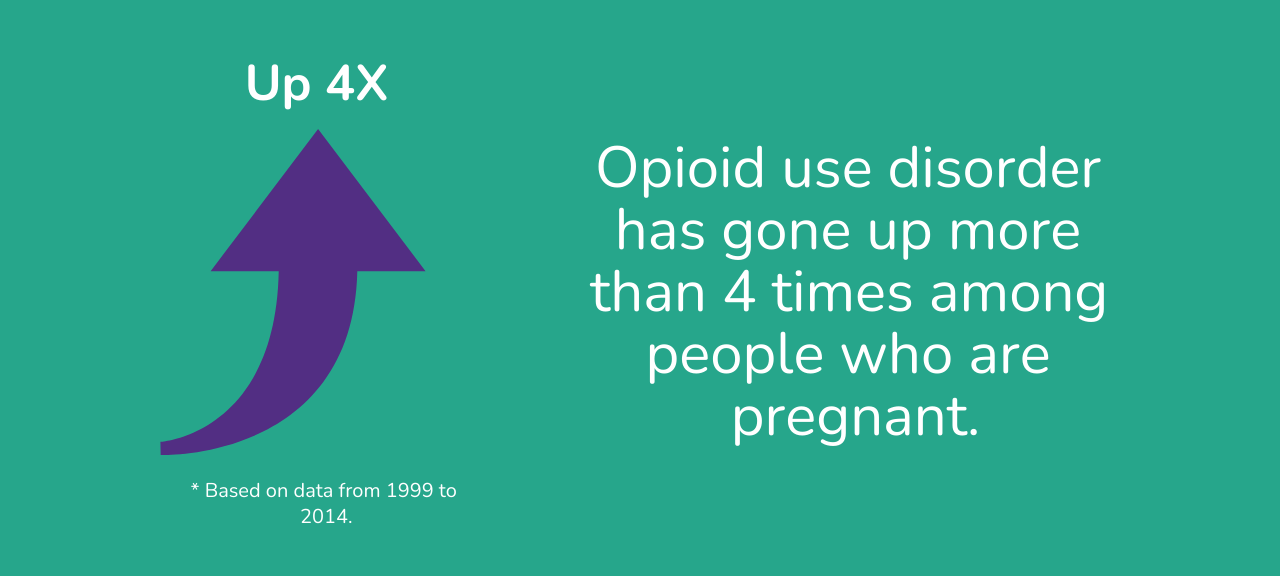About Opioid Use During Pregnancy & Breastfeeding
Disclaimer: This page houses important information and resources pertaining to opioid exposure during pregnancy and while breastfeeding, including links to our evidence-based Fact Sheets. However, the resources here should not replace the care and advice of a medical professional.
Opioids are drugs that relieve pain, sometimes called narcotics. Opioids include prescription pain relievers such as oxycodone (OxyContin®), hydrocodone (Vicodin®), codeine, and morphine (among others); synthetic opioids such as fentanyl; the illegal street drug heroin; and drugs that may be taken as part of medication-assisted treatment of an opioid use disorder such as methadone and buprenorphine.
The high rates of prescription and illicit opioid use are a significant public health concern, not only for [people who are pregnant and/or breastfeeding], but also for their infants. Opioids have the ability to cross placental and blood-brain barriers, thereby
— Lind et al., 2017
Opioid exposure during pregnancy has been linked to some adverse health effects for both people who are pregnant and their babies, including increased risk of maternal death, poor fetal growth, preterm birth, stillbirth, certain birth defects, and neonatal abstinence syndrome (also called neonatal opioid withdrawal syndrome). Opioid use while nursing may also pose some risk to a breastfed infant, as many opioids pass into breast milk. Use of some opioids in breastfeeding can cause the baby to be very sleepy and have trouble latching on. They may also cause breathing problems for the infant, and in some cases have resulted in infant death.
“On an almost daily basis I take care of [people] struggling with opioid addiction or dependency in pregnancy and the post-partum period,” says Sarah Obican, MD, a MotherToBaby expert and a Maternal-Fetal Medicine Subspecialist at the University of South Florida. Dr. Obican knows she’s not alone as the opioid epidemic rages on in America; it’s a crisis she and our other birth defects experts are trying to curb.

Reference: Centers for Disease Control and Prevention (CDC), 2018
Please see our library of resources below on opioid exposures during pregnancy and breastfeeding.
Related Fact Sheets
Related Baby Blogs
- Asking Questions That Count When Considering Adoption
- When Addiction Recovery Meets Pregnancy: Finding a Balance for Mom and Baby
- Spicing Up Your Life during Pregnancy and Breastfeeding: Are Spices and Herbs Ok?
- Dear Opioid-Addicted Moms-To-Be, We Are Here for You
- We’ve Come a Long Way, Baby! What Have Four Decades Taught Us about Alcohol and Drugs in Pregnancy?
External Resources
- American College of Obstetrics and Gynecology: Opioid Use Disorder and Pregnancy Frequently Asked Questions
- Centers for Disease Control and Prevention: Pregnancy and Opioid Pain Medications
- Centers for Disease Control and Prevention: About Opioid Use during Pregnancy
- March of Dimes: Prescription Opioids during Pregnancy
- National Institute on Drug Abuse: Substance Use While Pregnant and Breastfeeding
- Substance Abuse and Mental Health Services Administration: National Helpline for Treatment Referral and Information: 1-800-662-HELP (4357)
- Substance Abuse and Mental Health Services Administration: Behavioral Health Treatment Services Locator
Partners
Stay in Touch
Our e-Newsletter brings you the latest information, news, and resources from the experts at MotherToBaby.
Join a Study
Expecting parents deserve better information about medication use in pregnancy and breastfeeding – and you can help by participating in a study.
Ask Our Experts
Call, text, chat, or email for a free personalized risk assessment on exposures in pregnancy and breastfeeding.

